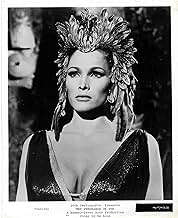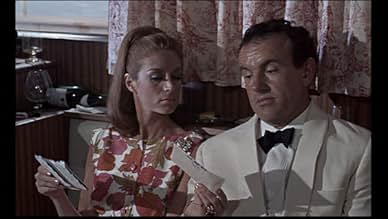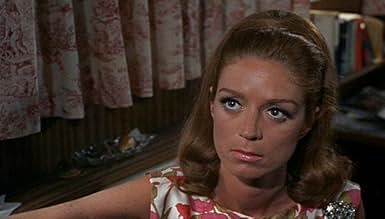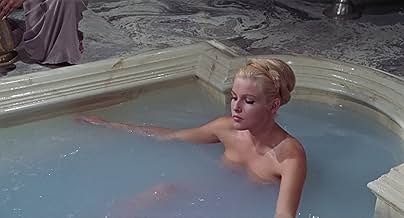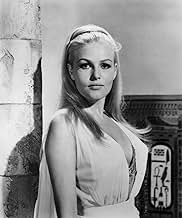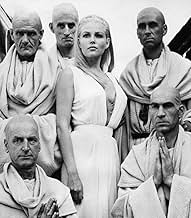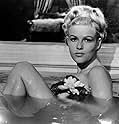NOTE IMDb
4,6/10
1,1 k
MA NOTE
Une jeune femme sème la mort autour d'elle: elle est irrésistiblement attirée par un prêtre immortel qui la prend pour la réincarnation de sa bien-aimée.Une jeune femme sème la mort autour d'elle: elle est irrésistiblement attirée par un prêtre immortel qui la prend pour la réincarnation de sa bien-aimée.Une jeune femme sème la mort autour d'elle: elle est irrésistiblement attirée par un prêtre immortel qui la prend pour la réincarnation de sa bien-aimée.
- Réalisation
- Scénario
- Casting principal
Olga Schoberová
- Carol
- (as Olinka Berova)
- …
Danièle Noël
- Sharna
- (as Daniele Noel)
Zohra Sehgal
- Putri
- (as Zohra Segal)
Maurice Connor
- Cultist
- (non crédité)
Avis à la une
Three years after their reasonably entertaining version of H. Rider Haggard's classic adventure 'She', Hammer Studios produced a sequel, 'The Vengeance of She'. Lacking the star power of the original (Ursula Andress, Peter Cushing and Bernard Cribbens are noticeable by their absence), the film is a dreary retread of events from the earlier movie, albeit with the roles reversed: this time around, it is the immortal Killikrates (John Richardson) who is pining for his long-dead love Ayeesha.
Convincing Killikrates that his soul-mate has finally been reborn in the form of a stunning European blonde named Carol (Olinka Berova), power-hungry occultist Men-Hari (Derek Godfrey) strikes a deal with the lovelorn leader: if he can successfully lure Carol to the lost African city of Kuma (using his powerful black magic), then he must be granted permission to pass through the sacred blue flame that would bring him immortality (and give him a pop at taking over the world!).
Compelled to travel to Africa by the voices in her head, the confused Carol is joined on her journey by Philip (Edward Judd), a concerned psychiatrist who is determined to ensure the beautiful young woman's safety.
On arriving at Kuma, and discovering the real reasons behind Carol's mysterious calling, Philip sets out to stop the poor girl from being brainwashed into believing she is Ayeesha, and prevent Men-hari from achieving his nefarious goal.
'The Vengeance of She' starts promisingly enough, with the sex-kittenish, mini-skirted Berova (think along the lines of Bardot, and you won't be far wrong) making quite an impression as she walks through the French countryside (accompanied by a haunting theme song), but it soon descends into a messy mish-mash of boring mystical mumbo-jumbo, lacklustre adventure, and unconvincing melodrama.
Director Cliff Owen wisely makes the most of Berova's awesome physical attributes to try and distract his audience, having her slip into clingy white robes that give viewers a tantalising glimpse of her marvellous milky puddings (please note: my workmate Phil wanted me to use that phrase in one of my comments), but even with endless gratuitous lingering shots of her semi-clad form, the film still winds up as something of a snooze-fest.
Convincing Killikrates that his soul-mate has finally been reborn in the form of a stunning European blonde named Carol (Olinka Berova), power-hungry occultist Men-Hari (Derek Godfrey) strikes a deal with the lovelorn leader: if he can successfully lure Carol to the lost African city of Kuma (using his powerful black magic), then he must be granted permission to pass through the sacred blue flame that would bring him immortality (and give him a pop at taking over the world!).
Compelled to travel to Africa by the voices in her head, the confused Carol is joined on her journey by Philip (Edward Judd), a concerned psychiatrist who is determined to ensure the beautiful young woman's safety.
On arriving at Kuma, and discovering the real reasons behind Carol's mysterious calling, Philip sets out to stop the poor girl from being brainwashed into believing she is Ayeesha, and prevent Men-hari from achieving his nefarious goal.
'The Vengeance of She' starts promisingly enough, with the sex-kittenish, mini-skirted Berova (think along the lines of Bardot, and you won't be far wrong) making quite an impression as she walks through the French countryside (accompanied by a haunting theme song), but it soon descends into a messy mish-mash of boring mystical mumbo-jumbo, lacklustre adventure, and unconvincing melodrama.
Director Cliff Owen wisely makes the most of Berova's awesome physical attributes to try and distract his audience, having her slip into clingy white robes that give viewers a tantalising glimpse of her marvellous milky puddings (please note: my workmate Phil wanted me to use that phrase in one of my comments), but even with endless gratuitous lingering shots of her semi-clad form, the film still winds up as something of a snooze-fest.
As the cover/poster of the film probably tells you, it cannot be taken completely seriously. It is full of silly sets, utterly bad taste skimpy dresses, bad acting and funny horror effects. The story, of course is something anyone could come up with in 20 minutes. Most enjoyable if you like "bad" films.
I was let down by Hammer Films' version of SHE (1965), so I wasn't particularly looking forward to its even less regarded sequel (concocted by Peter O'Donnell, who had earlier scripted the Joseph Losey camp classic MODESTY BLAISE [1966]!). Still, given that the film begins in a modern-day setting, I have to say that I found it mildly intriguing at first (following an unintentionally funny opening scene in which leading lady Olinka Berova is nearly raped by a loutish trucker who ends up trampled by his own vehicle!); however, once the scene shifts to the mythical city of Kuma, the film grinds to a halt - and, being one of Hammer's longest efforts at 101 minutes, this does it no favors at all! Though Mario Nascimbene is best-known for his scores of epic films and was probably assigned to this one for just that reason, the lounge music (including a title tune which is not half bad) he composed for the modern early scenes is actually the most effective part of his soundtrack!
The cast is, again, worth discussing: Berova, who's involved in some very mild nudity throughout, is undeniably gorgeous and yet rather petite to act as a stand-in for the statuesque Ursula Andress (trivia note - reportedly, she was deported from the U.K. on suspicions of espionage!); John Richardson, repeating his role from the original film but who has turned villainous in the interim, gives a wooden performance; rugged Edward Judd always makes for a compelling lead in this type of film (I especially loved the way he put-down an exotic dance number secretly organized for his entertainment while a prisoner in Kuma!); Colin Blakely and Jill Melford as a wealthy vacationing couple (on whose yacht a distraught Berova finds herself) make a fine impression, but they unfortunately exit the proceedings very early on; Noel Willman is virtually unrecognizable as a wizened learned man of Kuma; Andre' Morell, appearing in a different role from the one he played in the original, is an embarrassment as a sort of shaman spouting mumbo-jumbo.
As was the case with THE VIKING QUEEN (1967), there's some confusion with respect to the culture and the geography depicted in the film: the city of Kuma is supposed to be situated somewhere in North Africa, yet the natives - whom Judd meets during his journey to locate the kidnapped Berova - speak in Arabic. Similarly, both Morell and the high priests of Kuma are seen to be well-versed in the occult arts: I can't recall if this was as prominent a feature in the original Hammer film but, somehow, it all feels incongruous to the material!
The cast is, again, worth discussing: Berova, who's involved in some very mild nudity throughout, is undeniably gorgeous and yet rather petite to act as a stand-in for the statuesque Ursula Andress (trivia note - reportedly, she was deported from the U.K. on suspicions of espionage!); John Richardson, repeating his role from the original film but who has turned villainous in the interim, gives a wooden performance; rugged Edward Judd always makes for a compelling lead in this type of film (I especially loved the way he put-down an exotic dance number secretly organized for his entertainment while a prisoner in Kuma!); Colin Blakely and Jill Melford as a wealthy vacationing couple (on whose yacht a distraught Berova finds herself) make a fine impression, but they unfortunately exit the proceedings very early on; Noel Willman is virtually unrecognizable as a wizened learned man of Kuma; Andre' Morell, appearing in a different role from the one he played in the original, is an embarrassment as a sort of shaman spouting mumbo-jumbo.
As was the case with THE VIKING QUEEN (1967), there's some confusion with respect to the culture and the geography depicted in the film: the city of Kuma is supposed to be situated somewhere in North Africa, yet the natives - whom Judd meets during his journey to locate the kidnapped Berova - speak in Arabic. Similarly, both Morell and the high priests of Kuma are seen to be well-versed in the occult arts: I can't recall if this was as prominent a feature in the original Hammer film but, somehow, it all feels incongruous to the material!
Sequel to Hammer's version of She is actually more interesting than that film, at least to me. I loved the 1935 version of H. Rider Haggard's She. But the Hammer version did little for me. I found it very dull with only Ursula Andress' beauty to recommend it. This sequel is hardly a masterpiece but has enough going for it that it surpasses the previous film. The opening with the corny song playing while hitchhiking Carol (Olga Schoberova) is cornered by a rapist then saved by something mysterious is a moody start to things. The film keeps up that mood as the girl swims out to a yacht and hops aboard. She's being compelled towards Kuma, the lost city from the last film. Turns out Ayesha (again, from She) is attempting to possess the girl. As they make it closer to Kuma, the movie becomes a lot less interesting.
Olga Schoberova is beautiful but brings little to the part other than that. The scenes of her having nightmares screaming out "Ayeeeesha!" will give most viewers giggle fits. Still, she's not as wooden as Andress. Derek Godfrey is the bad guy but there's nothing bad about those awesome eyebrows. Edward Judd and John Richardson are solid. The great Andre Morrell has a small part as a man who helps Carol. Like She, this is pretty dry stuff. Worth watching for a nice score, atmospheric touches, and for Olga's beauty.
Olga Schoberova is beautiful but brings little to the part other than that. The scenes of her having nightmares screaming out "Ayeeeesha!" will give most viewers giggle fits. Still, she's not as wooden as Andress. Derek Godfrey is the bad guy but there's nothing bad about those awesome eyebrows. Edward Judd and John Richardson are solid. The great Andre Morrell has a small part as a man who helps Carol. Like She, this is pretty dry stuff. Worth watching for a nice score, atmospheric touches, and for Olga's beauty.
!!!THIS REVIEW CONTAINS PLOT SPOILERS!!!
This is one of the few well-known Hammer films I had never seen, until a few days ago. I had very low expectations and so, sat down to watch this with no preconceived ideas of real enjoyment; just of ticking another Hammer film off on my head as "seen".
The Vengeance of She is oddly enjoyable if totally trashy. The script goes in a vaguely similar line to the original 1965 She. It has minimal characterisation, has no inner continuity and the actions and deeds of some of the characters are totally anachronistic (e.g an Arab who seems steeped in Western magick rites and philosophy).
By the end I found myself totally disinterested if Carol (Olinka Berova) is the reincarnation of Ayesha or not. I was unmoved by the loss/love of Killikrates (John Richardson)and his dilemma of being immortal without his soul-mate. The actual events lost momentum for me even before reaching the Lost City.
So why watch this film? There is an ethereal beauty to this film. Other reviewers have mentioned the beauty of the lovely Ms Berova and she is stunning, so that is enough said about that. But the ethereal beauty is beyond just her looks alone.
The film has some wonderful images: Berova walking down a long winding road in a white fur coat, the desert sequence, the entry to Kuma, etc. The music score by Mario Nascimbene, including the song title (sung by Bob Fields), uses a haunting but very simple melody heard throughout the film in various guises. For the scenes set in the "modern world" it is played as a jazz miniature with solo saxophone. In Kuma, it becomes a chant with an ostinato figure derived from the main melody. I find this very effective.
The ethereality of these features combine to produce something unexpected. This film has stayed with me. Shallow, disjointed and incongruous as the whole thing is, there seems to be something of a 60s acid trip side-effect from this film that I cannot explain. The notions of exoticism; love unrequited or lost; beauty and decay; and glamorous adventure that are not really explicit (due to ineptitude in narrative and performances) in this film are what will now stay with me.
Perhaps in five years time or more, I will have a notion to return to this film... and be totally disappointed, wondering where the effect of this film, that stayed with me in the following days, actually came from. Yet, it is there and for this I give it a tentative recommendation and a very over-generous rating.
This is one of the few well-known Hammer films I had never seen, until a few days ago. I had very low expectations and so, sat down to watch this with no preconceived ideas of real enjoyment; just of ticking another Hammer film off on my head as "seen".
The Vengeance of She is oddly enjoyable if totally trashy. The script goes in a vaguely similar line to the original 1965 She. It has minimal characterisation, has no inner continuity and the actions and deeds of some of the characters are totally anachronistic (e.g an Arab who seems steeped in Western magick rites and philosophy).
By the end I found myself totally disinterested if Carol (Olinka Berova) is the reincarnation of Ayesha or not. I was unmoved by the loss/love of Killikrates (John Richardson)and his dilemma of being immortal without his soul-mate. The actual events lost momentum for me even before reaching the Lost City.
So why watch this film? There is an ethereal beauty to this film. Other reviewers have mentioned the beauty of the lovely Ms Berova and she is stunning, so that is enough said about that. But the ethereal beauty is beyond just her looks alone.
The film has some wonderful images: Berova walking down a long winding road in a white fur coat, the desert sequence, the entry to Kuma, etc. The music score by Mario Nascimbene, including the song title (sung by Bob Fields), uses a haunting but very simple melody heard throughout the film in various guises. For the scenes set in the "modern world" it is played as a jazz miniature with solo saxophone. In Kuma, it becomes a chant with an ostinato figure derived from the main melody. I find this very effective.
The ethereality of these features combine to produce something unexpected. This film has stayed with me. Shallow, disjointed and incongruous as the whole thing is, there seems to be something of a 60s acid trip side-effect from this film that I cannot explain. The notions of exoticism; love unrequited or lost; beauty and decay; and glamorous adventure that are not really explicit (due to ineptitude in narrative and performances) in this film are what will now stay with me.
Perhaps in five years time or more, I will have a notion to return to this film... and be totally disappointed, wondering where the effect of this film, that stayed with me in the following days, actually came from. Yet, it is there and for this I give it a tentative recommendation and a very over-generous rating.
Le saviez-vous
- AnecdotesAfter director Cliff Owen injured his back so badly that he was unable to work, producer Aida Young was forced to step in and direct the final few days of the film's location shoot.
- GaffesMen-Hari is clearly wearing contact lenses.
- ConnexionsEdited into Une messe pour Dracula (1970)
Meilleurs choix
Connectez-vous pour évaluer et suivre la liste de favoris afin de recevoir des recommandations personnalisées
- How long is The Vengeance of She?Alimenté par Alexa
Détails
- Durée1 heure 41 minutes
- Couleur
- Rapport de forme
- 1.85 : 1
Contribuer à cette page
Suggérer une modification ou ajouter du contenu manquant

Lacune principale
By what name was La déesse des sables (1968) officially released in India in English?
Répondre

